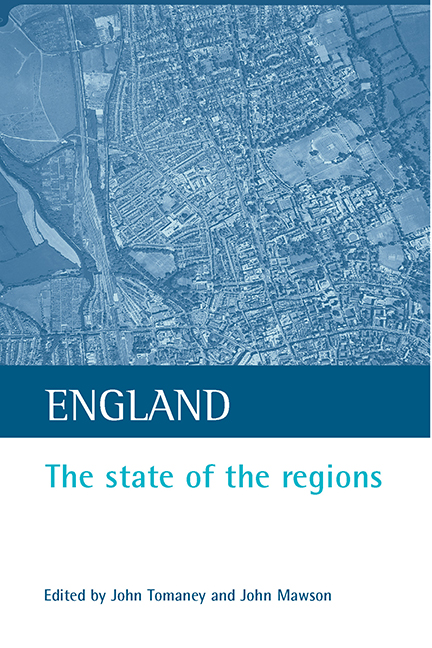Book contents
- Frontmatter
- Contents
- List of tables and figures
- Acknowledgements
- List of contributors
- one Introduction
- two Regional government in England: reviewing the evidence base
- three New Labour and the evolution of regionalism in England
- four Yorkshire (and the Humber)
- five Institutional collaboration in the West Midlands region
- six England's North West
- seven The South West
- eight Regionalism in the East of England
- nine The South East region?
- ten Regionalism in North East England
- eleven Regional strategy development in the East Midlands
- twelve The problem of regional governance
- thirteen Elected regional government: the issues
- fourteen Barnett plus needs: the regional spending challenge in Britain
- fifteen Conclusion: prospects for regionalism
- Index
- Also available from The Policy Press
two - Regional government in England: reviewing the evidence base
Published online by Cambridge University Press: 20 January 2022
- Frontmatter
- Contents
- List of tables and figures
- Acknowledgements
- List of contributors
- one Introduction
- two Regional government in England: reviewing the evidence base
- three New Labour and the evolution of regionalism in England
- four Yorkshire (and the Humber)
- five Institutional collaboration in the West Midlands region
- six England's North West
- seven The South West
- eight Regionalism in the East of England
- nine The South East region?
- ten Regionalism in North East England
- eleven Regional strategy development in the East Midlands
- twelve The problem of regional governance
- thirteen Elected regional government: the issues
- fourteen Barnett plus needs: the regional spending challenge in Britain
- fifteen Conclusion: prospects for regionalism
- Index
- Also available from The Policy Press
Summary
Introduction
The government was elected in 1997 with a commitment to a fundamental devolution of power, responsibilities and resources to the UK's constituent nations and regions. Alongside the most obvious manifestations of the ‘UK devolution project’ (Roberts, 2000), the establishment of the Scottish Parliament and the creation of directly elected Assemblies in Wales and Northern Ireland, England has frequently been portrayed as the “silent and uninvited guests at the devolutionary feast” (Wright, 2000, p 11). With the publication, in May 2002, of the White Paper Your region, your choice, the government's plans for taking forward its manifesto commitment to establish elected regional assemblies in England have now been set down (Cabinet Office/DTLR, 2002).
The focus of this chapter is the evidence base available for developing policy on elected regional assemblies within England. In recent years there has been a relative outpouring of research and (more often) commentary on different aspects of the ‘regional agenda’, with much debate focused on the ‘English question’: the implications of devolution for England and the desire (or otherwise) for an English tier of regional government. This chapter provides a brief review of the contribution of this research to some aspects of the debate surrounding the introduction of regional government. It is in no way intended to provide an exhaustive overview. Rather, it seeks to set down something of the wider research context within which policy decisions regarding elected regional assemblies have been made.
While the explicit focus of this chapter is about the research context within which decisions regarding English regional government policy were made, there is an important subtext relating to the operationalising of the government’s commitment to evidence-based policy. Previous work has reviewed the availability of evidence regarding the rationale for, and purpose of, regional assemblies (Russell Barter, 2000), the findings of which stressed the range of approaches and experiences between countries and quite often within them. Overseas experience provides some evidence on which to draw, although analysis of international systems reveals that the form of regional government is not fixed and that there is no consensus on what regional tiers should look like nor how they should operate.
- Type
- Chapter
- Information
- EnglandThe State of the Regions, pp. 11 - 24Publisher: Bristol University PressPrint publication year: 2002

